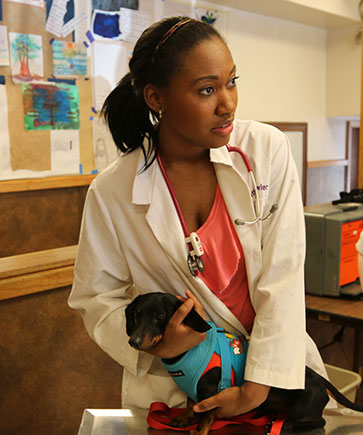At about noon on the second and fourth Saturday of every month, dozens of homeless and low-income Seattleites and their furriest friends start to snake around the block of Pioneer Square’s South Washington Street.

The draw? The Doney Memorial Pet Clinic — a pop-up facility that sets up shop in the Union Gospel Mission and offers free veterinary care from 3–5 p.m. thanks to volunteers like Dr. Heather Fowler, who’s working toward her Ph.D. in the School of Public Health’s Department of Environmental and Occupational Health Sciences. With the help of Fowler and other dedicated members of the community, the Doney Clinic aids those those who couldn’t otherwise afford veterinary care.
“There are studies that look specifically at the human-animal bond between homeless individuals and their pets,” says Fowler, who received a Martin Luther King Jr. Community Service Award from the UW earlier this year. “In that somewhat unstable environment where you don’t know where you’re going to eat or sleep at any given time, that consistent companion that you know won’t abandon you is really important for mental health and security.”
Fostering a healthy human-animal bond is at the core of Fowler’s studies. She’s found a mentor in Dr. Peter Rabinowitz, who directs the UW’s Center for One Health Research (COHR), and she’s taken on the role of COHR’s associate director of Animal Health. From farmers with their livestock to veterinarians with their patients, COHR’s mission is to investigate health as it relates to humans, animals and their shared environments — and develop innovative solutions for a healthy coexistence.
“Before I came to the UW, I spoke with Rabinowitz and said ‘These are my interests,’ and he said ‘Those fall in line with our center’s mission; follow them,’” says Fowler, who hails from New Jersey. “That’s really rare. A lot of times you go into a program and you have to wrap your interests around what they’re doing, whereas I’ve had the opportunity to really develop my own research plan and goals.”
Fowler’s research and goals are focused primarily on the occupational health of animal workers in environments such as dairy farms and veterinary clinics. In veterinary clinics, workplace hazards include anything from bites, scratches and infectious diseases to being exposed to toxins and radiation — which makes her outreach with the Doney Clinic the perfect place to put both her clinical and occupational health chops to use while leveraging her education to give back.
“If you ask 99.9 percent of veterinarians how long they wanted to be a veterinarian, they’ll tell you that they’ve wanted to be one ever since they were knee-high to a grasshopper,” says Fowler, whose plan is to one day educate animal care workers. “I love caring for animals and protecting their health and reinforcing the human-animal bond between pet owner and pet, and the Doney Clinic provides me with an outlet to do just that.”
In the future, COHR hopes to partner with the Doney Clinic to create a clinic that treats both the pet and the owner at the same time.
“There’s a homeless and low-income population here in Seattle that are in need of medical services, and the UW has all of these different health clinics throughout the city,” says Fowler. “We’re treating the same target audience, and while not every homeless person has a pet, many do — and many are more likely to seek care for their pet than themselves. This is an opportunity to help more people.”
